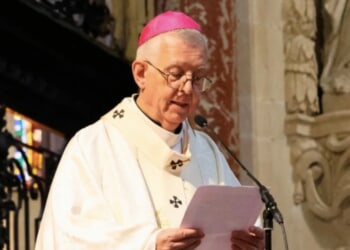President Trump’s latest broadside landed with the familiar thunder of one of his off-the-cuff declarations. In a rather interesting interview with NBC News, he called for billionaire George Soros to be “put in jail.” To his critics, it sounded like yet another wild Trump line, a flourish designed to inflame. It carried the same cadence as the time he promised “fire and fury” for Kim Jong Un, or when he declared NATO allies were “delinquent” freeloaders, or when he warned that the European Union was a “foe” in trade. Each line was ridiculed, painted as reckless exaggeration. And yet, time and again, those same lines revealed uncomfortable truths that polite opinion preferred to ignore. Trump’s style makes it easy to dismiss him. But if everything we have seen about Soros is true, his words deserve more than a shrug.
The Soros question matters because it embodies the clash between sovereignty and subversion.
Soros has spent decades funneling money into the arteries of the American left. His Open Society Foundation bankrolls activists, academics, and political operatives who wrap their work in the language of “justice” and “equity.” In practice, that money has underwritten campaigns to weaken police, abolish bail, and elect prosecutors who refuse to prosecute. The result is not legitimate justice but lasting disorder: theft normalized, violence excused, and citizens trapped in cities that no longer feel safe.
George Soros is not merely a donor. He is a designer. He builds networks that outlast elections. He funds think tanks that shape language, NGOs that craft narratives, and media outlets that amplify them. His fortune converts ideology into policy, bypassing the regular checks of democracy. The pattern repeats across continents.
In Eastern Europe during the 1990s, Soros money flowed into opposition movements, toppling governments and reshaping political orders. Hailed as a liberator, he was anything but. The costs were staggering. Sovereignty diluted, dependence on foreign funds entrenched, and aid organizations more loyal to donors than to the citizens they claimed to serve.
In Western Europe, his influence was just as disruptive. Through expansive lobbying networks, he championed mass migration, open borders, and supranational rule. Leaders who resisted were swiftly branded xenophobes or authoritarians. Nations that complied saw their political landscapes permanently altered. Hungary’s Viktor Orbán has made Soros the centerpiece of his political struggle precisely because his country became ground zero for this battle. Sovereignty on one side, Soros-backed networks on the other.
In Latin America, his foundations financed campaigns that elevated grievance politics into governing principles. Identity, not citizenship, became the currency of legitimacy. The results were predictable: division, polarization, and democratic institutions eroded from within.
In the United States, the same blueprint is visible. Soros has perfected the art of seeding local power. By spending relatively modest sums on district attorney races, he transformed the justice system from the bottom up. Cities like San Francisco, Chicago, and Philadelphia live with the consequences: lawlessness defended as compassion, prosecution rebranded as oppression.
This is why Trump’s blunt charge strikes a chord. When he brands Soros a “bad guy,” he is pulling from a record too extensive to ignore. And when he warns about Soros’ son Alexander—who now chairs the Open Society Foundations—he is pointing to a dynasty, a political fortune set to last generations. What looks like kindness to many on the left is, in fact, empire-building without borders.
Critics will call Trump’s demand for prison political theater. But his past “bluster” has a habit of aging well. When he railed against China’s trade practices in 2016, the establishment scoffed—until the numbers confirmed the damage. When he said Germany was “captive” to Russian gas, European leaders rolled their eyes—until Putin turned off the taps. His words are blunt instruments, but his instincts often cut closer to reality than the pompous pronouncements of the ruling class.
The Soros question matters because it embodies the clash between sovereignty and subversion. Soros’ defenders insist he is a benefactor for democracy, but his clear-eyed critics see something darker. The same man celebrated in Brussels as a visionary is vilified in Budapest as a saboteur. Both images cannot be true, yet both define him. Deep down, every honest observer knows which one is real.
The timing of Trump’s remarks, in the wake of Charlie Kirk’s brutal assassination, made them even more pointed. Conservatives already feel hunted, targeted by a left increasingly tolerant of political violence. Soros, in this context, does not appear as an abstract donor. He appears as the man funding the very forces that smear, silence, and, in their most extreme corners, applaud attacks on ideological rivals.
So, does George Soros deserve to be behind bars? If justice still means anything, if law is applied without fear or favor, then the answer is not just yes—it is emphatically yes.
READ MORE from John Mac Ghlionn:




![Gavin Newsom Threatens to 'Punch These Sons of B*thces in the Mouth' [WATCH]](https://www.right2024.com/wp-content/uploads/2025/08/Gavin-Newsom-Threatens-to-Punch-These-Sons-of-Bthces-in-350x250.jpg)
![ICE Arrests Illegal Alien Influencer During Her Livestream in Los Angeles: ‘You Bet We Did’ [WATCH]](https://www.right2024.com/wp-content/uploads/2025/08/ICE-Arrests-Illegal-Alien-Influencer-During-Her-Livestream-in-Los-350x250.jpg)








